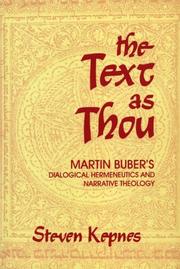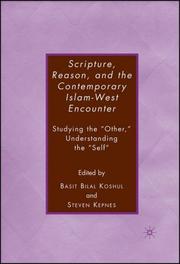| Listing 1 - 8 of 8 |
Sort by
|

ISBN: 0585104778 9780585104775 0253331277 9780253331274 Year: 1992 Publisher: Bloomington Indiana University Press
Abstract | Keywords | Export | Availability | Bookmark
 Loading...
Loading...Choose an application
- Reference Manager
- EndNote
- RefWorks (Direct export to RefWorks)
The Text as Thou establishes Martin Buber's central concept of "I-Thou" as the heart of a dialogical theory of textual interpretation and a narrative method for explicating Jewish philosophy and theology. Part One takes up Buber's application of his hermeneutic method to the texts of Hasidism and the Bible and the way in which that method can be applied to secular texts as well. His development of a dialogical hermeneutics links Buber to such contemporary theorists as Gadamer, Ricoeur, and Bakhtin. Part Two demonstrates that narrative provides privileged access to Buber's thought. By the retelling of Hasidic tales, biblical stories, and autobiographical anecdotes with powerful immediacy and concreteness, Buber succeeds in a daring attempt to formulate a modern narrative Jewish theology. Taken together, Buber's dialogical hermeneutics and narrative theology constitute a key element in the contemporary revival of the Jewish midrashic imagination.
Hermeneutics --- Language and languages --- Narrative theology --- Philosophy --- Philosophy & Religion --- Theology, Doctrinal --- Foreign languages --- Languages --- Anthropology --- Communication --- Ethnology --- Information theory --- Meaning (Psychology) --- Philology --- Linguistics --- History --- Religious aspects --- Buber, Martin, --- Buber, Martin
Book
ISBN: 9781108233705 9781108415439 9781108401432 Year: 2021 Publisher: Cambridge Cambridge University Press
Abstract | Keywords | Export | Availability | Bookmark
 Loading...
Loading...Choose an application
- Reference Manager
- EndNote
- RefWorks (Direct export to RefWorks)
Book
ISBN: 9780470659601 9780470659618 Year: 2013 Publisher: Chichester Wiley & Sons
Abstract | Keywords | Export | Availability | Bookmark
 Loading...
Loading...Choose an application
- Reference Manager
- EndNote
- RefWorks (Direct export to RefWorks)
Book
ISBN: 1108244157 1108245862 1108233708 Year: 2021 Publisher: Cambridge : Cambridge University Press,
Abstract | Keywords | Export | Availability | Bookmark
 Loading...
Loading...Choose an application
- Reference Manager
- EndNote
- RefWorks (Direct export to RefWorks)
The Cambridge Companion to Jewish Theology offers an overview of Jewish theology, an aspect of Judaism that is equal in importance to law and ethics. Covering the period from antiquity to the present, the volume focuses on what Jews believe about God and also about the relation of God to humans and the world. Parts I and II cover exciting new research in Jewish biblical and rabbinic theology, medieval philosophy, Kabbalah (mysticism), and liturgy. Parts III and IV turn to modern theology with an exploration of works by leading figures, such as Rabbi Abraham I. Kook, Franz Rosenzweig, and Emmanuel Levinas, as well as the relation of theology to issues such as feminism and the Holocaust, and the relation of Judaism to other world religions. In Part V, the book explores how the insights of analytic philosophy have been integrated with Jewish theology.
Judaism --- God (Judaism) --- Doctrines. --- Teologia jueva --- Déu
Book
Abstract | Keywords | Export | Availability | Bookmark
 Loading...
Loading...Choose an application
- Reference Manager
- EndNote
- RefWorks (Direct export to RefWorks)

ISBN: 1403975353 9781403975355 Year: 2007 Publisher: New York Palgrave
Abstract | Keywords | Export | Availability | Bookmark
 Loading...
Loading...Choose an application
- Reference Manager
- EndNote
- RefWorks (Direct export to RefWorks)
Christianity and other religions --- Islam --- Essence, genius, nature --- Relations --- Christianity --- Europe --- Islamic countries
Book

ISBN: 1618111825 9781618111821 1618111604 9781618111609 9781618111609 Year: 2012 Publisher: Boston, MA
Abstract | Keywords | Export | Availability | Bookmark
 Loading...
Loading...Choose an application
- Reference Manager
- EndNote
- RefWorks (Direct export to RefWorks)
This collection includes two symposia, on "The Renaissance of Jewish Philosophy in America" and on "Maimonides on the Eternity of the World," as well as other studies in medieval Jewish philosophy and modern Jewish thought. Contributors include: Leora Batnitzky, Ottfried Fraisse, William A. Galston, Lenn E. Goodman , Raphael Jospe, Steven Kepnes, Haim Howard Kreisel, Charles Bezalel Manekin, Haggai Mazuz, Paul Mendes-Flohr, Alan Mittleman, Michael Morgan, David Novak, James T. Robinson, Norbert M. Samuelson, Dov Schwartz, Yossef Schwartz, Kenneth Seeskin, Roslyn Weiss, and Martin Yaffe.
Jewish philosophy. --- Philosophy, Israeli. --- Israeli philosophy --- Jewish philosophy --- Jews --- Philosophy, Jewish --- Philosophy, Israeli --- Philosophy
Book

ISBN: 1280597747 9786613627575 3110247755 9783110247756 3110247747 9783110247749 9783110247749 9781280597749 6613627577 Year: 2012 Volume: 60 Publisher: Berlin Boston
Abstract | Keywords | Export | Availability | Bookmark
 Loading...
Loading...Choose an application
- Reference Manager
- EndNote
- RefWorks (Direct export to RefWorks)
Since the Enlightenment period, German-Jewish intellectuals have been prominent voices in the multi-facetted discourse on the reinterpretation of Jewish tradition in light of modern thinking. Paul Mendes-Flohr, one of the towering figures of current scholarship on German-Jewish intellectual history, has made invaluable contributions to a better understanding of the religious, cultural and political dimensions of these thinkers' encounter with German and European culture, including the tension between their loyalty to Judaism and the often competing claims of non-Jewish society and culture. This volume assembles essays by internationally acknowledged scholars in the field who intend to honor Mendes-Flohr's work by portraying the abundance of religious, philosophical, aesthetical and political aspects dominating the thinking of those famous thinkers populating German Jewry's rich and complex intellectual world in the modern period. It also provides a fresh theoretical outlook on trends in Jewish intellectual history, raising new questions concerning the dialectics of assimilation. In addition to that, the volume sheds light on thinkers and debates that hitherto have not been accorded full scholarly attention.
Jewish philosophy --- Judaism and philosophy. --- Judaism --- Jews --- Religions --- Semites --- Philosophy and Judaism --- Philosophy --- Philosophy, Jewish --- Philosophy, Israeli --- History. --- Religion --- Judaism and philosophy --- History --- Jewish philosophy - Germany --- Judaism - Germany - History --- German-Jewish History. --- Jewish Intellectual History. --- Jewish Philosophy. --- Modern Judaism. --- Religious Philosophy.
| Listing 1 - 8 of 8 |
Sort by
|

 Search
Search Feedback
Feedback About UniCat
About UniCat  Help
Help News
News